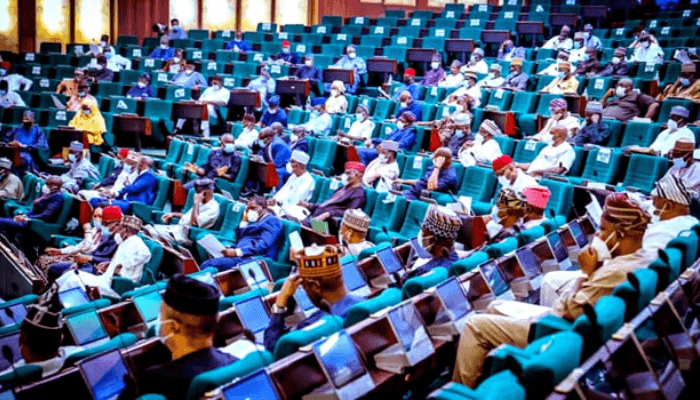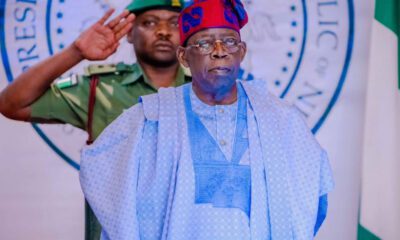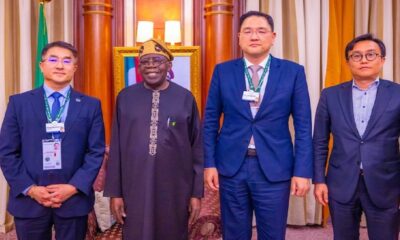News
Nigeria signs agreement to establish joint Chamber of Commerce with Qatar

…As Alake pushes for investment in Nigeria’s mining sector
Nigeria has signed an agreement to establish a joint chamber of commerce with the Qatari Government.
This was disclosed in a press statement by the spokesperson to the President, Ajuri Ngelale on Sunday.
President Bola Ahmed Tinubu is currently on a state visit to Qatar to strengthen trade relations.
The President and His Highness, Sheikh Tamim bin Hamad Al Thani, Emir of the State of Qatar, on Sunday in Doha, witnessed the signing of historic agreements between both nations, opening a gateway for leveraging the potential of mutual cooperation in pivotal sectors of education, enterprise development, investment promotion, youth empowerment, mining, tourism, and sports.
Before the signing ceremony at the Qatar Presidential Palace, President Tinubu assured his host of Nigeria’s preparedness to welcome investors into the country, noting the ongoing reforms that favour innovation, return on investments, and multiculturalism.
“Our greatest strength is our people. Our strength lies in the capacity of Nigerian youths. They have energy, talent, and self-belief. They are quality partners for the Qatari industry. They are educated and reliable, and they are proactively seeking to add value wherever they are. A few cannot give a bad name to the many. Nigerian youths are ready to be unleashed for the mutual benefit of both nations.
“We have seen clearly the rapid pace and thorough quality of Qatar’s development process. It is impossible not to be moved by what you have accomplished. The leadership in the country has proven its mettle, and we are here to gain deeper insight.
“There is nowhere in the world where you will find return on investment at the level of what you will see in Nigeria. A massive market of over 200 million skilled Nigerians, always industrious and ready to work.
“We face some short-term turbulence at the moment, but we have a government today that reflects the dynamism and talent of the Nigerian people. We are implementing the right solutions. This team works collaboratively with each other and our partners. Nigeria is ready for serious business,” the President stated.
The Emir of the State of Qatar, His Highness, Sheikh Tamim bin Hamad Al Thani, emphasised that Qatar is open to President Tinubu’s investment push, recalling that he traveled to Nigeria in 2019 owing to his belief that Nigeria is an important and strategic ally on its own and within the context of its role in regional affairs.
“I have no doubt about the great capacity of the Nigerian people. Everywhere in the world, they are known for their brilliance and hard work. We only need to ensure that this is happening inside of Nigeria rather than outside. The investments we have made around the world have been very fruitful.
“This is because we take our time and study opportunities before we invest in the commonwealth of our people. It is not my money. The money we invest belongs to the future generations of Qatar.
“Mr. President, I am very encouraged by your actions and your passion to create new opportunities. We are very open to this, and follow-up is everything at this point. The will is there for both of us, but we must follow up. I will send a team of officials to Nigeria after Ramadan, and we will advance discussions on what some of the actionable investment opportunities are,” the Qatari leader said.
President Tinubu immediately named the Coordinating Minister of the Economy and Minister of Finance, Mr. Wale Edun as the team leader of the government team that will interface with Qatari authorities in investment identification and implementation moving forward.
Furthermore, during the bilateral deliberations, President Tinubu enabled a brief presentation to the Emir by the Minister of Solid Minerals Development, Dr. Dele Alake, who spoke in detail about the high-grade of several minerals, including lithium, immediately derivable across the country with an emphasis on imminent opportunities for local mineral processing and value-additive industry in the sector.
The bilateral engagement was followed by a closed-door meeting between the two Heads of State before they proceeded to the signing ceremony for seven bilateral agreements across multiple sectors.
The seven agreements signed are: cooperation agreement in the field of education; regulation of employment of workers with the Government of Qatar; establishment of a joint business council (JBC) between the Qatar Chamber of Commerce and Industry and the Nigerian Association of Chambers of Commerce, Industry, Mines, and Agriculture (NACCIMA); in addition to a cooperation agreement in the field of youths and sports.
The other agreements are: cooperation in the field of tourism and business events, and a memorandum of understanding combating illicit trade in narcotic drugs and psychotropic substances.
The documents were signed by the Minister of Foreign Affairs, Ambassador Yusuf Tuggar, and relevant officials in the Government of the State of Qatar, Buthaina bint Ali Al Jabr Al Nuaimi, Minister of Education and Higher Education; Dr. Ahmad Hassen Al-Hammadi, Secretary General at the Ministry of Foreign Affairs; Sheikh Khalifa Bin Jassim Al Thani, Chairman of Qatar Chamber of Commerce & Industry (QCCI), and Abdullah bin Khalaf bin Hattab Al Kaabi, Undersecretary of the Ministry of Interior (MOI).
Nigerian ministers who were present at the ceremony were: Coordinating Minister of the Economy and Minister of Finance, Mr. Wale Edun; Minister of Solid Minerals Development, Dr. Dele Alake; Coordinating Minister of Health and Social Welfare, Professor Muhammad Ali Pate; Minister of Trade, Industry and Investment, Dr. Doris Uzoka-Anite; and the Minister of State for Petroleum Resources (Gas), Mr. Ekperipe Ekpo.
Also at the meeting were the National Security Adviser, Mallam Nuhu Ribadu, and Special Adviser on Energy, Mrs. Olu Verheijen.
News
Tinubu targets increased gas production, unveils plants in Delta, Imo


President Bola Tinubu will commission three critical gas infrastructure projects undertaken by the Nigerian National Petroleum Company Limited and its partners.
They are the AHL Gas Processing Plant 2 in Delta State, the ANOH Gas Processing Plant, and the ANOH-OB3 CTMS Gas Pipeline Projects in Imo State. The gas projects have a combined estimated output of 1,400 million standard cubic feet per day.
Special Adviser to the President on Media and Publicity, Ajuri Ngelale, disclosed this in a statement he signed Friday titled ‘President Tinubu to commission critical gas infrastructure projects.’
“The projects support the federal government’s effort to grow value from the nation’s gas assets while eliminating gas flaring…and deepen domestic gas supply as a critical enabler for economic prosperity,” said Ngelale.
The AHL Gas Processing Plant 2 is an expansion to the Kwale Gas Processing Plant, which currently supplies about 130MMscf/d of gas to the domestic market.
The processing plant is designed to process 200MMscf/d of rich gas and deliver lean gas through the OB3 Gas Pipeline. However, the facility already injecting gas is scheduled to ramp up to 180mmscfd by the end of May.
Ngelale said this additional gas supply will “support further rapid industrialisation of Nigeria” and also “produce about 160,000 MTPA of Propane and 100,000 MTPA of Butane, which will reduce the dependency on LPG Imports.”
The AHL Gas Plant is being developed by AHL Limited, an incorporated Joint Venture owned by NNPC Limited and SEEPCO.
Meanwhile, the ANOH gas plant is an integrated 300MMscf/d capacity gas processing plant designed to process non-associated gas from the Assa North-Ohaji South field in Imo State.
The plant will produce dry gas, condensate, and LPG. The gas from the ANOH plant will significantly increase the domestic gas supply, leading to increased power generation and accelerated industrialisation.
The ANOH Gas Plant is being developed by ANOH Gas Processing Company, an incorporated Joint Venture owned by NNPC Limited and Seplat Energy Plc on a 50-50 basis.
With the facility mechanically completed in December 2023, the NNPC says it is finalising pre-commissioning activities.
Third is the ANOH-OB3 CTMS Gas Pipeline Project, which the Presidency said involves the engineering, procurement, and construction of 36”x23.3km ANOH-OB3 Project.
“The Transmission Gas Pipeline will evacuate dry gas from the Assa North-Ohaji South primary treatment facility to the OB3 Custody Transfer Metering Station for delivery into the OB3 pipeline system,” read the statement.
About 600MMscf/d is estimated to be available from two separate 2 x 300MMscf/d capacity gas processing production trains from AGPC & SPDC JV.
The 23.3km Anoh-OB3 PPL is scheduled for mechanical completion by May 15, 2024.
When commissioned, the projects will increase gas supply to the domestic market by approximately 500mmscf/d, creating a better investment climate and promoting balanced economic growth cumulatively, the Presidential Spokesman affirmed
News
House of Reps to review laws, practices restricting press freedom


The House of Representatives said on Friday that it would review the laws and practices restricting press freedom and the ability of the media to carry out its constitutional role in the country.
Rep. Akin Rotimi, Chairman, House Committee on Media and Public Affairs, said this while delivering a keynote address, to mark the 2024 World Press Freedom Day organised by the Konrad Adenauer Stiftung, Nigeria.
Rotimi said the legislature would prepare the ground for journalists to operate without any hindrance provided they adhere to the tenets of their profession.
“We will enhance good governance practices, transparency and
accountability through media chats, public hearings, town hall meetings, etc., amongst other scheduled legislative actions in Agenda 6,” he said.
The International Press Freedom Day, celebrated every May 3, is a day of reflection among media professionals and stakeholders on issues of press freedom and professional ethics.
Rotimi said that the 10th House of Representatives led by Speaker Tajudeen Abbas, had resolved to work with the media to ensure a successful running of the present government.
He said that the 1999 Constitution of the Federal Republic of Nigeria (as amended) conferred on the press a critical role as contained in Section 22 regarding obligations of the mass media.
“The role states that the press, radio, television and other agencies of the mass media shall at all times be free to uphold the fundamental objectives in this chapter and uphold the responsibility and accountability of the government to the people.
“Amongst many other challenges in the course of the discharge of this constitutional mandate, the press faces a disproportionate exposure to harm in the face of the widespread insecurity challenges in the country.
“There are also issues around the dearth of funding but I call on all stakeholders to continue with concerted efforts to address these challenges.
“There is no gainsaying that there are many miles to cover as far as media freedoms in our country is concerned but we have greatly improved from the days of military intervention in our polity (particularly, 1983 – 1998),” Rotimi added.
He urged the media to encourage introspection and self-regulation, and also look at the self-defeating ways that the press delegitimises their own struggle by not upholding ethics, and address them.
Mr Lukas Laible, Deputy Resident Representative, Konrad Adenauer Stiftung, Nigeria, said the press had become the enabler of Nigerian democracy.
“May 3 of every year is an important day for journalists as freedom of speech is the beacon of the practice.
“Without freedom of speech there won’t be freedom of press, and without freedom of the press, no society can be free.
“Journalists don’t just cover events, they are the people’s transmitter and they show capability in handling issues. They hold political leaders accountable and that is what makes democracy viable.
“Holding political leaders accountable enhances good governance. If the press fails to hold the government accountable, it will deviate from the people,” Laible said.
According to him, the press is so much trusted by the people and as such must make the people know the value of a free world.
Mrs Franca Aiyetan, Secretary, Nigerian Broadcasting Commission (NBC), who spoke during a panel session, urged journalists to always do their job in a way that would not consume the people.
Aiyetan, while speaking on the theme “Navigating the Intersection of Media Regulations, Press Freedom Advocacy and Ethical Journalism in the Face of Environmental Crises”, noted that NBC was established to have a formidable Nigerian media.
She said that NBC was not established as an attack dog for the government and as such would want the press to always work with it.
“If a detail about a truth will set two tribes against each other, then, there is something wrong with that truth.”
Another panelist, Mrs Mojirayo Ogunlana, the Executive Director, Digicivic Initiative, said journalists needed laws that should protect them while discharging their job.
“Threats to the lives of journalists should be declared as a state of emergency,” Ogunlana added.
She urged media practitioners to self-regulate themselves to prevent the government from exploiting any vacuum that could give it the opportunity to pounce on them.
News
Stop using repressive laws to intimidate journalists – SERAP, NGE tell FG


The Socio-Economic Rights and Accountability Project, SERAP, and Nigeria Guild of Editors, NGE, have called on Nigerian authorities at all levels of government to stop using repressive and anti-media laws to target, intimidate and harass journalists, critics and media houses.
The groups made the demand after an interactive session on ‘the state of press freedom in Nigeria’ held at the Radisson Blu Hotel in Ikeja.
In a joint statement, SERAP and NGE said that, “the government of President Bola Tinubu, the country’s 36 governors and FCT minister must now genuinely uphold press freedom, ensure access to information to all Nigerians, obey court judgments, and respect the rule of law”.
They expressed concerns about the escalating crackdown on the right to freedom of expression and media freedom and the flagrant disregard for the rule of law by authorities at all levels of government.
The groups note that the suppression of the press in recent times takes various forms ranging from extrajudicial to unlawful detentions, disappearances, malicious prosecutions and wrongful use of both legislation and law enforcement.
The statement read in part: “We would continue to speak truth to power and to hold authorities to account for their constitutional and international obligations including on freedom of expression and media freedom.
“Nigeria as a country has a long and unpleasant history of press gagging and clampdown on media freedom, which is evidence of extensive state censorship of media and in some cases, the utter control of state-owned media houses.
“This position has not changed considerably despite almost 25 years of unbroken democratic rule in the Fourth Republic.”
-
capital market2 years ago
Rt.briscoe, FBNH, Others halts negative performance of stock market
-
Finance3 months ago
Court orders Sen. Victor Umeh to repay N136m bank debt to AMCON
-



 Abuja Update2 months ago
Abuja Update2 months agoUNDP, FG partnership needed to achieve inclusion, equity- Minister
-
Abuja Update1 month ago
Banks drive stock market performance with N147bn gain
-



 Business2 weeks ago
Business2 weeks agoTingo Group unveils Tingo Electric, Tingo Cola drink at Lagos launch
-



 Health2 weeks ago
Health2 weeks agoCapacity training will reduce migration of health workers- NPHCDA
-
News4 months ago
Oil thieves sponsoring malicious media campaign against Navy – Spokesman
-



 Infotech1 month ago
Infotech1 month agoWorld Backup Day: NITDA urges Nigerians to ensure backup of data











